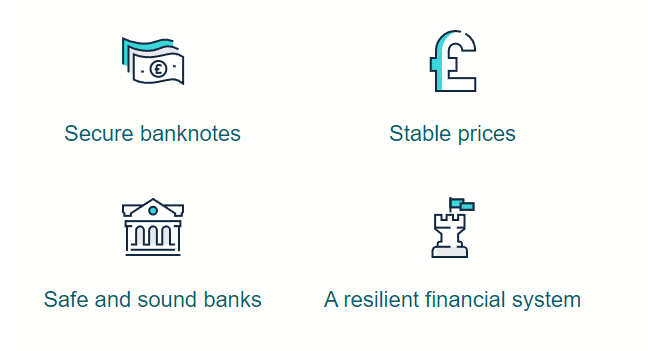Bank of England
Our job is to make sure the UK has:

We are the UK’s central bank
One of our main jobs is to make sure you can pay for things easily and securely in the UK. So we produce banknotes (cash) and oversee many of the other payment systems you use (eg with a debit or credit card).
We also work to keep the cost of living stable so your money keeps its purchasing power. One way we do this is by changing the main interest rate in the UK.
And we regulate UK banks and other financial firms so you know they are safe and sound.
Our job
We provide ways to pay for things safely
We produce £5, £10, £20 and £50 banknotes you can trust. They have security features that make them difficult to counterfeit (fake). Our new £20 is our securest note ever.
We supervise payment services (eg VISA), which help you pay for things easily and safely. We also run the core services that enable people, businesses and banks to make large transfers (eg CHAPS), and the banks to settle balances among themselves.
Only we can issue banknotes in England and Wales. Other banks can issue banknotes in Scotland and Northern Ireland. But we regulate them to ensure their notes are safe. We settle the net interbank transfers for several retail and card systems. Each day we settle around £500 billion worth of payments between banks.
We keep price rises low and stable
We guard the value of your money by keeping prices stable. The measure of how much prices go up over time is called inflation.
The Government asks us to keep inflation at 2%. That’s because low and stable inflation is good for the UK economy. We do this by setting the core interest rate at which we lend to the banks, and by buying (or selling) assets. This process is called monetary policy.
We make sure banks are run well
Our Prudential Regulation Authority regulates and supervises all the major banks, building societies, credit unions, insurers and investment firms in the UK.
We keep the whole UK financial system stable
People need a stable financial system and it’s our job to make sure the UK has one.
A financial system connects people who want to save, invest or borrow money. It's a vital part of our economy.
We keep the UK’s financial system stable by keeping a close watch on any risks and taking action, if we need to.
For example, we can lend to banks if they need it to ensure they can continue to lend to businesses and support the economy. And we make sure that a failing bank doesn’t cause problems for the depositors, UK taxpayers or the wider economy.
Our Financial Policy Committee (FPC) identifies and monitors risks in the financial system, and takes action to reduce or remove them where necessary.
Every six months it publishes a Financial Stability Report to highlight possible risks and explain what we’re doing about them.
Our services support UK financial stability
We provide wholesale banking services to the UK Government and over 100 overseas central banks. And we also offer liquidity support and other services to banks and other financial institutions.
Our supervision supports critical infrastructure
We also supervise financial market infrastructures, which provide functions that are critically important to the UK financial system, such as payment systems and clearing houses.
We make sure a failing bank doesn’t cause wide scale problems
If a UK bank fails, we use our resolution powers to manage any associated risks to depositors, taxpayers or the wider economy.
How we do our job
We gather data
We gather and analyse data from banks and building societies, credit unions, insurers and mortgage companies. We publish much of it in our regular statistical releases.
The UK's Office for National Statistics (ONS) is a major customer for our data. We've published our service agreement with them.
We also provide data to the European Central Bank (ECB) and the Bank for International Settlements (BIS).
We research
Research helps us to make better decisions. Data is an important part of this work. But we also listen to businesses and local communities around the UK.
Our research agenda sets our research priorities. We welcome research contributions from academics, policymakers and experts across all disciplines.
Our researchers take part in academic conferences and publish in peer-reviewed journals.
Our staff can publish their views on research issues in our Bank Underground blog and in working papers. To encourage debate we organise research seminars and conferences.
Listening to businesses and communities
We have a team of ‘agents’ who go around the UK talking to businesses and communities to understand what is happening locally. You can read their regular report ‘Agents’ Summary of Business Conditions’ or find out about our community outreach programme.
We produce education resources
We want everyone to understand how the economy works and what we do. So we produce introductory guides to the economy and free education resources for schools.
You can also get involved in other ways. For example, you can apply to take part in one of our local Citizens' Panels or host one of our Community Forums.
How to contact us
Main contact number
020 3461 4444 (Monday to Friday, 9am to 5pm)
Please use this number if you know the name of the person or department you would like to contact. Or you can fax 020 3461 4771.
General enquiries
Have a look at our links to popular topics (such as exchanging old banknotes). You may also find the answer in our FAQs. Or you can get in touch by email, phone, post or social media:























































First, please LoginComment After ~